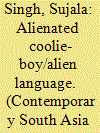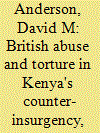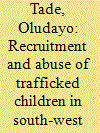| Srl | Item |
| 1 |
ID:
116058


|
|
|
|
|
| Publication |
2012.
|
| Summary/Abstract |
The primary focus of this essay is on the representation of child labour in Mulk Raj Anand's Coolie (1936). I argue that the young-ness of Munoo, the coolie-boy is significant for understanding Anand's social critique of the colonial-capitalist machinery and its reliance upon the sub-waged labour of children and adolescents. It is limiting to read the novel as merely a social critique, however, as it also opens up crucial debates on what it means for an Indian writer writing in English to represent a young ostracised citizen-subject who can hear English and mimic its sounds without having access to an English education. Anand's use of an adolescent is thus significant as an early attempt at foregrounding regional disenfranchisement in English. Through the tropes of listening, seeing, and smelling, and Anand's selective translations and transliterations, I show why Munoo's adolescence matters: it provides a social commentary as well as enabling Anand to highlight the conundrum of representing Munoo's semi-literate, non-English subjectivity into the English language.
|
|
|
|
|
|
|
|
|
|
|
|
|
|
|
|
| 2 |
ID:
116256


|
|
|
|
|
| Publication |
2012.
|
| Summary/Abstract |
Accusations of abuse and torture in the counter-insurgency campaign against Mau Mau rebels in Kenya were widely publicised during the 1950s. The typical British response was to issue official denials, and when prosecutions did arise the perpetrators were characterised as pathological, their behaviour presented as isolated and exceptional. New evidence found in the British colonial 'Migrated Archive' for Kenya now confirms that the practice of torture and abuse was widespread, amounting to a systematic pattern of state policy. This article rejects dispositional and individual explanations of British torture in Kenya and instead examines the violence in temporal and structural terms, showing how the toleration of violence at an early stage of the Emergency led to its institutionalisation in Kenya's detention camps at a later stage. The article offers evidence from the screening process in the first phase of the counter-insurgency campaign, and from the 'dilution technique' applied in the detention camps after 1956 in the final phase of the war to illustrate the argument. The concluding discussion explores the dilemmas confronting Kenya's colonial violence workers and their political masters as they struggled to present torture as lying within the 'rule of law'.
|
|
|
|
|
|
|
|
|
|
|
|
|
|
|
|
| 3 |
ID:
134353


|
|
|
|
|
| Summary/Abstract |
This article examines the recruitment and transportation of internally trafficked children from Benue State in the north-central geo-political zone of Nigeria to Oyo State in the south-western zone of Nigeria. The study is essentially qualitative: with the aid of the snowball sampling technique, in-depth interviews (IDIs) were conducted with drivers, employers and trafficking agents in two recipient communities in Ibadan. The findings show that human rights abuses manifest at the recruitment, transportation and destination phases. The human rights abuses include the recruitment of underage children for domestic work outside their immediate family environments; transportation under inhumane conditions; restriction of movement at traffickers' ‘warehouses’; non-disclosure of amount payable for the services of domestic servants by agents/traffickers; exclusion of domestic servants in wage negotiations; and violence by employers. In view of these, there is a need for the National Agency for the Prohibition of Trafficking in Persons to strengthen its internal trafficking campaign.
|
|
|
|
|
|
|
|
|
|
|
|
|
|
|
|